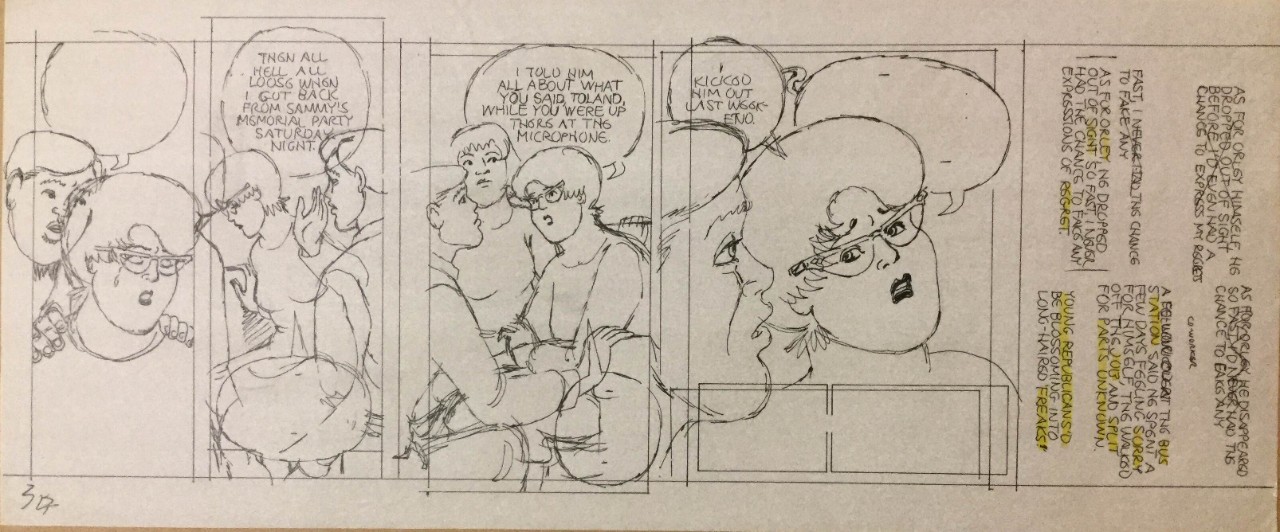Rare Book & Manuscript Library Acquires Howard Cruse Archives
 Cruse's personal archives include numerous pieces of preparatory material, including this sample from his graphic novel, "Stuck Rubber Baby."
Cruse's personal archives include numerous pieces of preparatory material, including this sample from his graphic novel, "Stuck Rubber Baby."
Working primarily in New York City in the 1970s, ‘80s and ‘90s, Cruse was the first cartoonist to incorporate themes such as the AIDS epidemic, gay bashing and the gay rights movement into his illustrations, earning praise as the “father of gay comics.” The decades during which many of Cruse’s illustrations were published were tumultuous for the gay community in New York, and Cruse appreciates the opportunity to return pieces of his work to the city.
“It feels especially appropriate [that my archives are with Columbia] since the core of my cartooning life, not to mention my years as a participant in the gay liberation movement, was spent a few subway stops away from the University in New York City,” Cruse said. “I’m thrilled to have my personal correspondence and career artifacts become part of [this] amazing comics archive.”
Cruse authored a number of comic strips that considered such issues, including “Barefootz” and “Wendel,” published in The Advocate during the 1980s. He is widely recognized for his semi-autobiographical graphic novel, Stuck Rubber Baby, which follows fictional protagonist Toland Polk as he grapples with his own homosexuality and rampant racial inequality in the mid-20th century American South. The work won numerous accolades from the comics industry as well as a nomination for the American Library Association’s Lesbian and Gay Book Award. Among Cruse’s papers are 18 pages from the novel and several preliminary and working drafts of the manuscript.
Indeed, Cruse hopes that “making the preparatory stages that went into many of my drawings available will provide worthwhile insights into both the creative process in general and my own individual evolution as a cartoonist.”
The archives also include pieces from Cruse’s adolescence and young adulthood: personal correspondence, preparatory sketches, short fiction, unpublished plays and other artifacts intended to encourage aspiring illustrators.
As a potential expert witness in a censorship case that involved Vancouver’s Little Sisters bookstore, Cruse penned a number of essays in defense of the bookshop, which was targeted by Canadian Customs authorities in 2001. The articles contribute to the RBML’s extensive collection of materials related to First Amendment rights and freedom of speech.
“Cruse’s archives mesh incredibly well with many of our other collections,” said Karen Green, Adjunct Curator for Comics and Graphic Novels said. “The papers address so many intersecting areas of study – the history of comics, the history of New York, the history of publishing. This is going to be an important collection.”
The RBML will host a discussion with Cruse on October 13 at 6 p.m. in 523 Butler Library at 535 W. 116th St. The event will be free of charge and open to the public.
Cruse’s papers join an emerging collection of comics in the RBML, curated by Green. Established in 2010 with the acquisition of X-Men novelist Chris Claremont’s archives, the collection also hosts the archives of Al Jaffee, a frequent contributor to Mad Magazine, and Denis Kitchen, founder of Kitchen Sink Press, as well as a wide-ranging collection of 20th- and 21st-century American humor magazines. Gifted by Columbia alum Steven Boss, the collection features more than 3,000 individual issues, representative of 360 publications, the earliest of which dates to 1918. The Libraries also recently acquired archival material from Mort Gerberg, a New York City-based gag cartoonist whose illustrations have appeared in The New Yorker and Playboy, among other publications.
Columbia University Libraries is one of the top five academic research library systems in North America. The collections include over 13 million volumes, over 160,000 journals and serials, as well as extensive electronic resources, manuscripts, rare books, microforms, maps, and graphic and audio-visual materials. The Libraries employs more than 400 professional and support staff and hosts over 4.7 million visitors each year. The website of the Libraries is the gateway to its services and resources: library.columbia.edu.